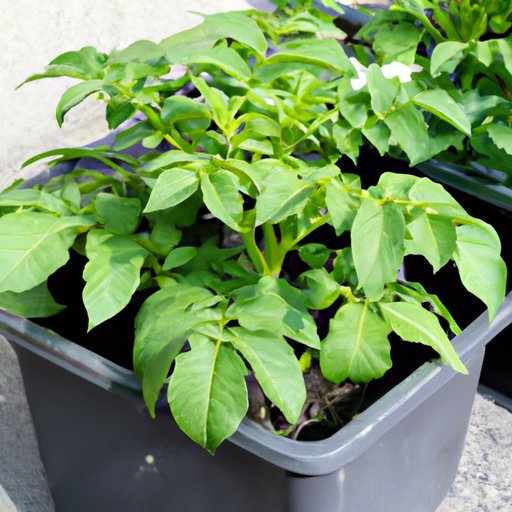
I. Introduction
Do you know that potatoes are one of the easiest vegetables to grow in a container? Not only do they provide a satisfying crop, but they also thrive in container gardening, making them ideal for small spaces like balconies, patios, and decks. However, growing potatoes in containers require a bit of planning and know-how to ensure their success. In this article, we’ll provide the ultimate guide to growing potatoes in a container. We’ll cover everything from choosing the right container to ensuring the best yield.
II. The Ultimate Guide to Growing Potatoes in a Container
Why Container Gardening is a Good Option for Growing Potatoes
Potatoes are incredibly adaptable and can grow in various conditions. However, growing them in a container has numerous benefits over traditional methods. Container gardening is space-efficient and allows growers to control soil quality and moisture, essential factors for successful potato-growing. Additionally, it makes it easier to harvest and manage pests and diseases.
List of Benefits of Using a Container Over Traditional Methods
One of the significant advantages of using a container to grow potatoes is that it allows for early planting by taking advantage of the microclimate in the container. It also prevents soil-borne diseases, reduces pest problems, and prevents soil compaction, which can lead to reduced yield.
Various Types of Containers Available for Potato-Growing
Containers come in different shapes, sizes, and styles, making them a versatile option for growing potatoes. Some of the options include plastic buckets, grow bags, and wooden crates. These containers have their benefits and drawbacks, and choosing the right one is essential for successful potato-growing.
Tips for Selecting the Right Container
When selecting a container for growing potatoes, there are several factors to consider, such as size, drainage, and material. A container size of at least five gallons will provide adequate space for the potato roots to grow. Also, ensure that the container has drainage holes that prevent water-logging. Finally, consider the material of the container that is durable and lightweight.
III. 10 Simple Steps to Grow Potatoes in a Container Successfully
Preparation of the Container and Soil
Before planting, ensure that the container is thoroughly cleaned and sanitized. This step is essential in preventing pest and disease problems. Next, fill the container with high-quality potting soil, which will provide the necessary nutrients and structure for the potatoes.
Planting
Start by selecting certified seed potatoes, which are free from disease and provide higher yield. Cut the seed potatoes into small pieces, each containing at least one or two eyes. Plant the seed potatoes in a few inches of soil and then add more soil when the shoots appear. Ensure that only the top 1-2 inches of the leaves are visible.
Care
Potatoes require adequate moisture, so ensure to water consistently but avoid over-watering, which can lead to root rot. Additionally, provide the container with enough sunlight, at least six hours per day. As the plants grow, add more soil to the container, leaving only the top leaves visible.
Ensuring Success
Regularly monitor the potatoes for pests and diseases, and take action immediately if you notice any symptoms. Additionally, feeding the potatoes with fertilizer regularly will promote growth and improve yield.
IV. Container Gardening: How to Grow Potatoes in Small Spaces
Challenges of Growing Potatoes in Small Spaces
Growing potatoes in small spaces presents several challenges, such as limited space, access to light and airflow, and restricted watering. However, with the right container and growing techniques, it’s possible to grow potatoes successfully in small spaces.
Best Container Types and Sizes for Small Spaces
When growing potatoes in small spaces, choosing the right container is crucial. Some of the best options for small spaces include vertical gardens, window boxes, and hanging baskets. Always choose a container that fits your space and the amount of potatoes you want to grow.
Tips and Advice for Maximizing Space Efficiency
To maximize space efficiency, consider growing compact potato varieties, such as fingerling potatoes. Additionally, grow potatoes in containers that complement your décor and style. You can decorate the container with flowers or paint it to match your favorite colors.
V. Growing Potatoes in Containers: Tips, Tricks, and Ideas
Additional Tips and Tricks for Container Gardening
When growing potatoes in containers, consider adding additional plants that thrive in similar growing conditions. These companion plants will improve soil quality, deter pests, and provide additional crop yields. Also, consider rotating your crops in different containers, as this creates healthy soil conditions and reduces pest infestation.
Ensuring the Best Yield
To ensure the best yield, harvest the potatoes when the leaves turn yellow, indicating the end of the growing season. Let them dry for a few weeks before removing the soil and storing them in a cool, dry place away from direct sunlight.
Creative Ideas for Decorating or Customizing Your Container
When it comes to decorating or customizing your container, the options are endless. Consider painting the container to match your decor or wrapping it in burlap for a rustic feel. You can also add stickers or decals or decorate it with streamers and ribbons.
VI. Harvest Fresh Potatoes From Your Balcony – A Beginner’s Guide to Container Potato Gardening
Growing potatoes in a container is easy and rewarding. Following the tips and techniques outlined in this guide will provide you with a bountiful crop of fresh potatoes. Whether you’re an experienced gardener or a beginner, container potato gardening is an excellent way to grow flavorful, fresh potatoes without leaving your balcony or patio.
VII. Conclusion
In conclusion, growing potatoes in a container is an excellent option for urban and small space gardening. By choosing the right container, soil, and following the proper care and maintenance, you can grow a bountiful harvest of fresh, flavorful potatoes. Remember to rotate your crops, monitor for pests and diseases, and customize your container to suit your style and taste.





